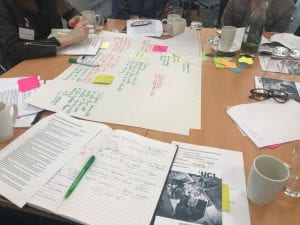How can practitioners change records for the better?
By Victoria Hoyle, on 17 June 2019
Social care recordkeeping is a complex system, with many dozens of people involved in contributing to, preserving and providing access to just one person’s file. Multiply that by the 72,000+ children and young people currently in care and there are 100,000s of practitioners involved in producing and maintaining social care records all across the country. If we’re going to change and improve recordkeeping practice then reaching that audience is a high priority. Earlier this year we secured an additional £15,000 of funding for the MIRRA project to share our research more widely and talk to social work and information professionals about records’ issues and why they matter.* We started working in close partnership with the British Association of Social Workers (BASW) and the Archives and Records Association (ARA) to reach out to sectors that very rarely talk to one another.
As part of a programme of events (including our sold-out conference on 18th July – you can join the waiting list if you didn’t manage to get a place) we recently hosted two workshops with practitioners in London and Manchester. With over 60 people attending in total, from a range of backgrounds in the public, voluntary and private sectors, from children’s home managers to information governance managers, we generated a lot of brilliant and interesting discussion. Many of the topics will be familiar: the challenge of depleted budgets and resources, both for Children’s Services and records work; the complexities of digital recording systems; and the legacy of less-than-ideal practices from the past. At the beginning of the session we premiered a video we have made about the MIRRA project with our care-experienced research team (link coming soon!), which helped to keep the debate rightly focused on the impact records have on care-experienced people.
A visual minute taker joined us at both events to illustrate the conversations as they developed, and help us to see both consensus and actions emerging. These artworks highlight some of the key priorities the workshops identified, which in turn will help us to develop the resources practitioners need for better recordkeeping. The first step was convincing people they needed to act, and now the second will be providing them with tools to help. This is something I will be focusing on over the next five months as the project comes to the end of its first phase. Here are just some of the most critical lessons we learnt during the sessions:
- Social care teams and information/records management teams rarely work together or communicate regularly. They inhabit very different worlds, culturally and practically. All of the guidance we produce has to speak to both sectors and encourage practitioners to work together. The less fragmented recordkeeping is the better.
- Training in recordkeeping is needed at all levels. We’ve often talked about training for social workers or records managers, but the complexity of the system means we need a holistic approach. Everyone who works with children and young people or their records should have training.
- The regulatory and inspection regimes provided by Ofsted and the Information Commissioner’s Office are very important but can have a negative impact on recordkeeping, creating risk averse and inflexible approaches. Children, young people and care leavers get squeezed out by processes that are designed to fit a standard rather than support the individual. Activism is needed to work with the regulators to establish child-centred, care-centred recordkeeping as best practice.
- Thinking about records in terms of retention schedules, performance management and accountability doesn’t properly reflect their importance as memory and identity resources. If we shift our thinking about who records are for and why they are so vital then we can make small changes that support people. For example, we can write records in children’s own words rather than paraphrasing them, and we can extend the time we keep them beyond the minimum retention to the life time of the person they are about. Small actions like this, taken on a case-by-case basis, can make a huge difference.
Thanks to everyone who participated in the workshops. I’m looking forward to sharing the resources we create very soon. Watch out for the link to the short film when it’s released and do share it on social media.
*This funding was from the UKRI’s Higher Education Innovation Fund (HEIF), via UCL’s Innovation and Enterprise programme.
 Close
Close





